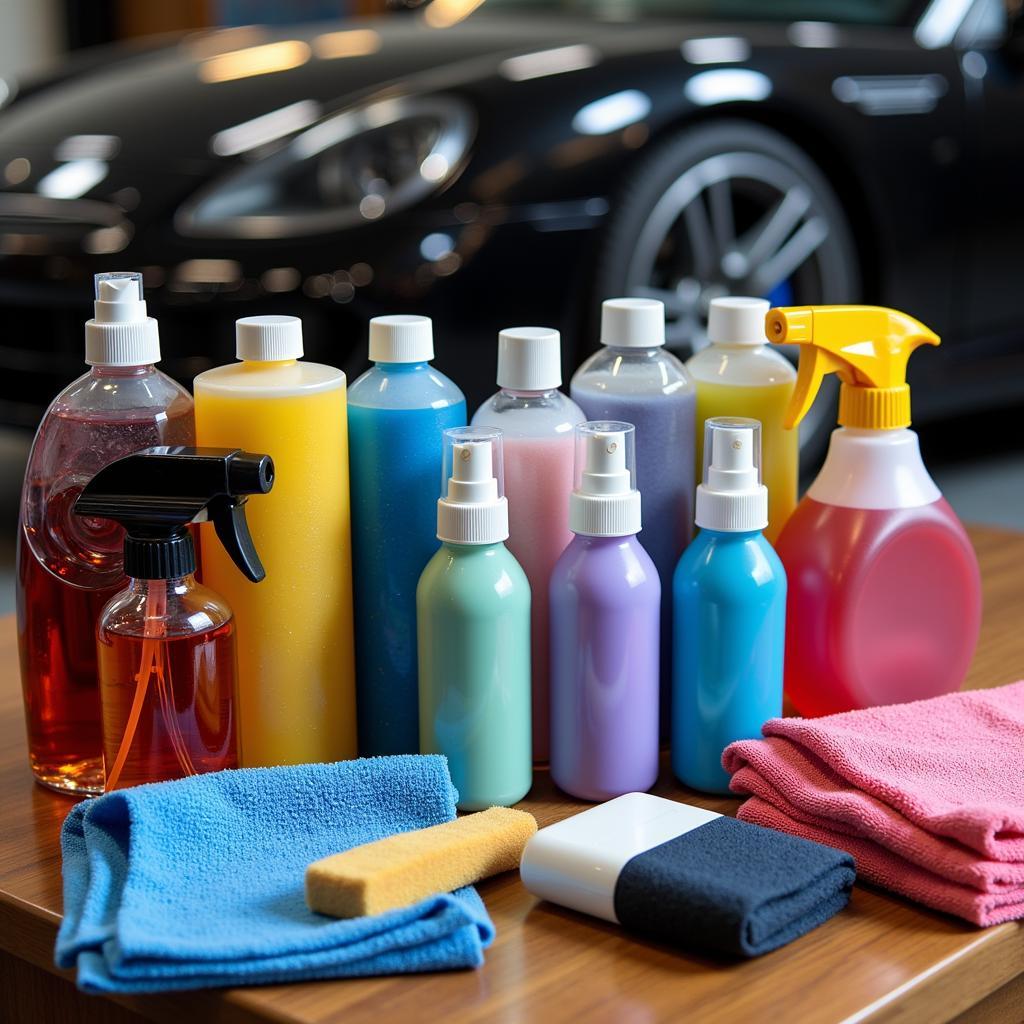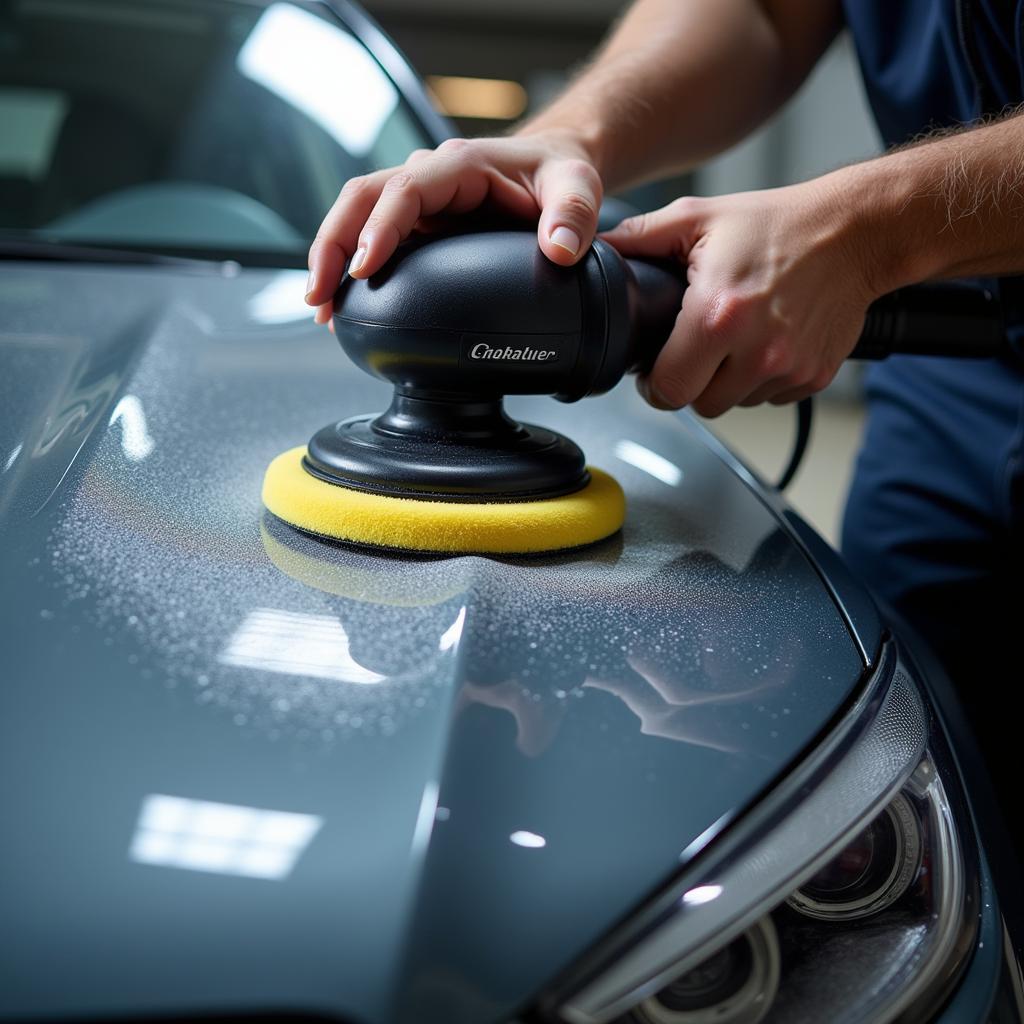Car detailing is more than just a quick wash and wax; it’s about restoring your car to its former glory and maintaining that showroom shine. But achieving professional-level results requires the right arsenal of chemicals.
This comprehensive guide delves deep into the essential Chemicals Needed For Car Detailing, empowering you to make informed decisions and elevate your detailing game.
Understanding Car Detailing Chemicals
Before we dive into specifics, it’s crucial to understand that car detailing chemicals are specifically formulated to clean, restore, and protect various surfaces of your vehicle. From powerful degreasers to gentle pH-balanced washes, each product serves a unique purpose.
Remember, using the correct chemical for each stage of the detailing process ensures optimal results and prevents potential damage to your car’s delicate finishes.
Essential Chemicals for a Showroom Shine
 Car Detailing Chemicals Kit
Car Detailing Chemicals Kit
1. Car Wash Soap
Ditch the dish soap! Using a dedicated car wash soap is non-negotiable. These pH-neutral formulas effectively lift dirt and grime without stripping away your car’s protective wax or sealant, preserving its shine.
2. Wheel Cleaner
Wheels take a beating from brake dust, road grime, and tar. A dedicated wheel cleaner utilizes specialized chemicals to dissolve these stubborn contaminants without harming the wheel’s finish.
3. Iron Decontamination Spray
Ever noticed those tiny brown spots that seem to reappear even after a wash? That’s iron contamination, and it requires a dedicated iron decontamination spray. These products work by dissolving iron particles, releasing them from the paintwork for a smooth, contaminant-free surface.
4. Clay Bar and Lubricant
Think of clay bar treatment as a spa day for your car’s paint. The clay bar, paired with a dedicated lubricant, gently lifts embedded contaminants, like overspray, tree sap, and industrial fallout, leaving your paint feeling smooth as glass.
5. Compound and Polish
Scratches and swirl marks dulling your car’s shine? Compounding utilizes abrasives to level out imperfections, followed by polishing to refine the paintwork, resulting in a mirror-like finish.
 Car Polishing Process
Car Polishing Process
6. Car Wax or Sealant
Protecting your car’s paint is paramount, and that’s where car wax or sealant comes in. Wax provides a warm, natural shine and offers a degree of protection, while sealants create a durable, hydrophobic barrier that repels water and contaminants.
7. Glass Cleaner
Achieving streak-free, crystal-clear windows requires a dedicated glass cleaner. These formulations effectively cut through grime, fingerprints, and smudges, providing optimal visibility.
8. Interior Detailer
From dashboards to leather seats, a quality interior detailer cleans and protects various surfaces within your car. Choose a product that suits your car’s interior materials for optimal results.
Choosing the Right Chemicals
Navigating the vast world of car detailing chemicals can feel overwhelming, but considering these factors can guide your decision:
1. Your Car’s Specific Needs: A heavily contaminated vehicle might require more aggressive cleaning solutions compared to a regularly maintained car.
2. Your Detailing Goals: Are you aiming for a quick refresh or a complete restoration? Your goals dictate the type and strength of chemicals needed.
3. Product Reviews and Recommendations: Leverage the experiences of fellow detailers. Online reviews and forums provide valuable insights into product performance and suitability.
Pro Tips from a Detailing Expert
“Always start with the least aggressive method and product first,” advises Jason Parker, a seasoned car detailing professional with over 15 years of experience. “Test any new chemical on an inconspicuous area before applying it to the entire car.”
Parker also emphasizes the importance of following product instructions diligently and investing in quality microfiber towels to prevent swirls and scratches.
Conclusion
Having the right chemicals is crucial for achieving professional-level car detailing results. By understanding the purpose of each product and following proper techniques, you can unlock your car’s true potential, restoring its shine and preserving its beauty for years to come.
FAQs
1. Can I use household cleaners for car detailing?
Using household cleaners on your car is not recommended as they can strip away wax, damage paint, and cause rubber and plastic components to deteriorate.
2. How often should I detail my car?
A full detail is recommended every 3-6 months, while regular washes and interior cleaning can be done weekly or bi-weekly.
3. What is the difference between a car wax and a sealant?
Car wax provides a warm shine and moderate protection, while sealants offer more durable protection and a sleeker, reflective finish.
4. Can I apply car detailing chemicals in direct sunlight?
Avoid applying chemicals in direct sunlight as the heat can cause them to dry too quickly, leading to streaks and water spots.
5. How do I dispose of car detailing chemicals properly?
Refer to the product label and local regulations for proper disposal guidelines. Never pour chemicals down the drain!
Need Help with Your Car Detailing Journey?
Contact us via WhatsApp: +1(641)206-8880 or Email: [email protected]. Our 24/7 customer support team is ready to assist you.

Leave a Reply